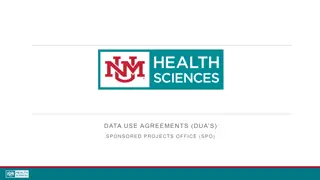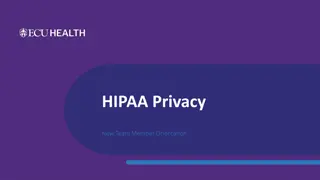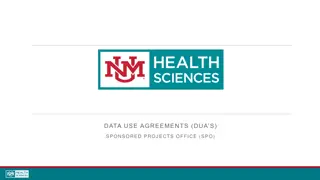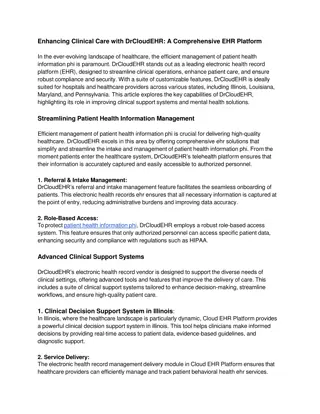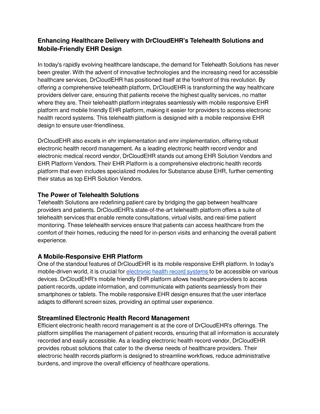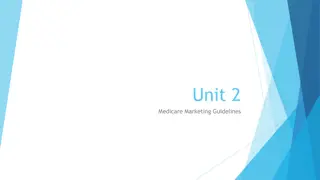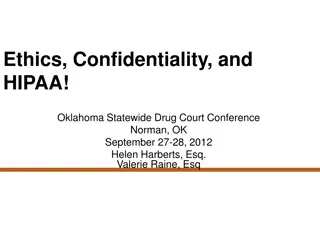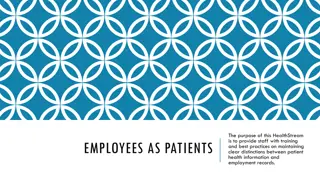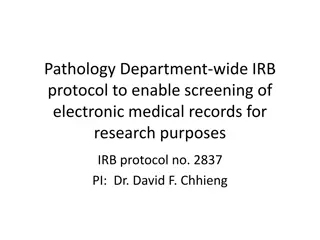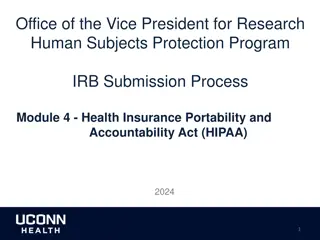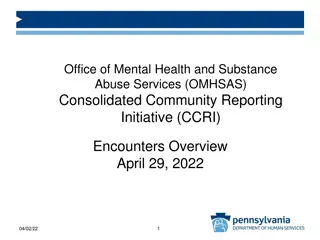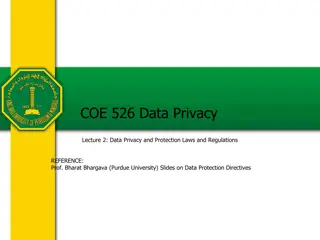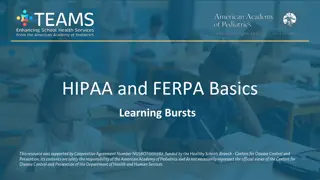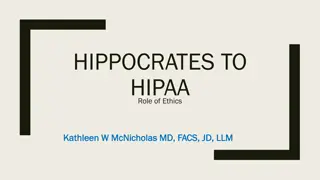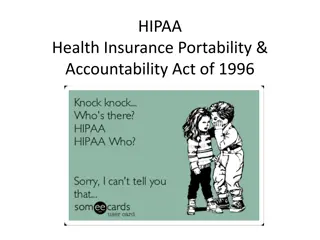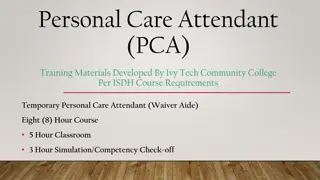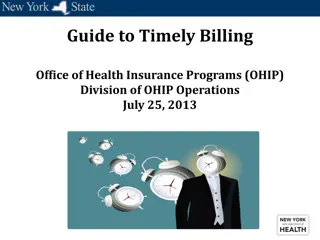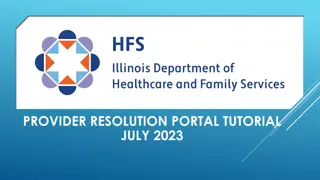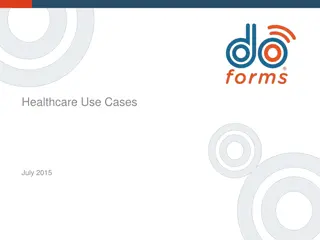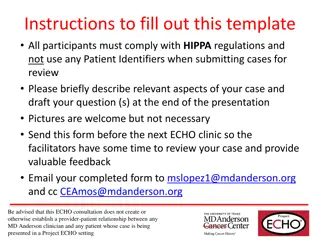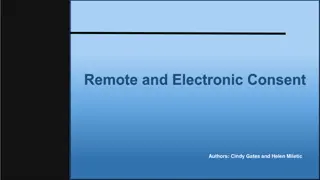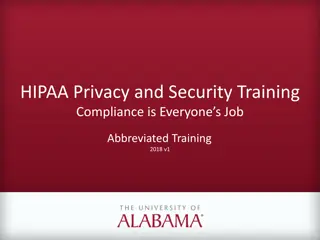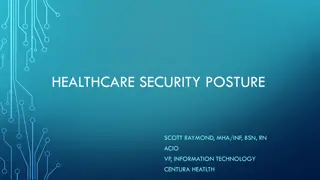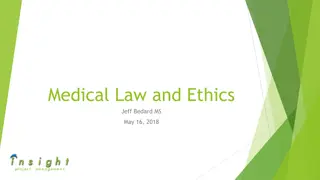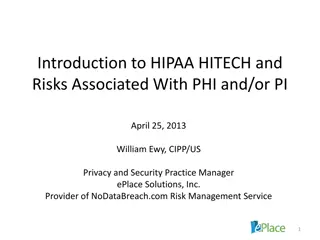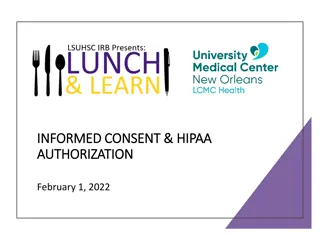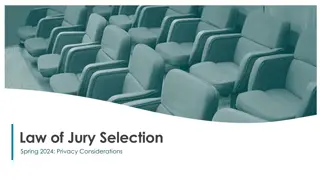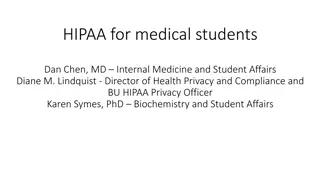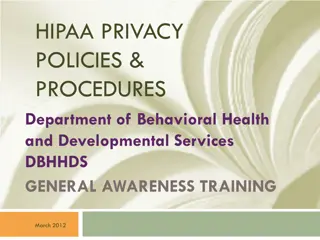Understanding Data Use Agreements (DUAs) for Sponsored Projects
A Data Use Agreement (DUA) is a crucial contract facilitating the secure transfer of non-public data between providers and recipients, especially in projects subject to restrictions like HIPAA. This informative content delves into the significance, requirements, and scenarios where DUAs are essentia
2 views • 19 slides
HIPAA Privacy
The Health Insurance Portability and Accountability Act (HIPAA) is crucial federal legislation that safeguards the privacy and security of health data, known as Protected Health Information (PHI). This orientation material explores what PHI entails, including examples and elements, as well as patien
0 views • 24 slides
Understanding Data Use Agreements (DUAs) in Sponsored Projects Office
Data Use Agreements (DUAs) are contractual agreements between data providers and recipients, ensuring proper handling of non-public data, especially data subject to restrictions like HIPAA. DUAs address data use limitations, liability, publication, exchange, storage, and protection protocols. HIPAA
6 views • 19 slides
Article 30_ Enhancing Clinical Care with DrCloudEHR_ A Comprehensive EHR Platform
Prioritize privacy in healthcare with DrCloudEHR's clinical solutions in Washington State, Illinois, Idaho. Safeguard electronic protected HIPAA and health information for secure, confidential care
1 views • 3 slides
Enhancing Healthcare Delivery with DrCloudEHR's Telehealth Solutions and Mobile-Friendly EHR Design
DrCloudEHR Empowers control with role based access to personal health records in Washington State, Illinois, Idaho. Safeguard HIPAA protected health information
2 views • 3 slides
Understanding Medicare Marketing Guidelines and Regulations
Explore the essentials of Medicare marketing guidelines, including HIPAA privacy regulations, sales events requirements, Permission to Contact (PTC) procedures, and compliance standards. Learn about agents' responsibilities in safeguarding client information and conducting sales activities. Stay inf
1 views • 46 slides
ECHO Case Review Template Submission
This template provides structured guidance for participants to submit cases for review at an ECHO session, ensuring compliance with HIPAA regulations. Presenters share relevant case details, interventions, barriers, and questions for the navigation team. Facilitators can provide valuable feedback be
0 views • 6 slides
Transitioning to Cloud Storage Strategy
Executing a comprehensive cloud storage strategy for UTHSC involves ensuring data security, accessibility, support, and cost-effectiveness. Components include document digitization, OneDrive/SharePoint optimization, migration plans, and awareness campaigns. The move from physical servers to cloud st
1 views • 9 slides
Understanding Ethics, Confidentiality, and HIPAA in Drug Treatment Courts
Explore the importance of ethics, confidentiality, and HIPAA regulations in drug treatment courts. Learn about the laws such as 42 CFR Part 2 and HIPAA that protect the privacy of patient records. Discover who is covered by these laws and the entities that receive federal assistance. Gain insights i
0 views • 43 slides
NCVHS Subcommittee on Privacy Comments on HIPAA Privacy Rule for Reproductive Health Care
NCVHS Subcommittee on Privacy, Confidentiality, and Security provided comments on the Notice of Proposed Rulemaking (NPRM) to modify the HIPAA Privacy Rule for reproductive health care privacy. The NPRM aims to address concerns post-Dobbs ruling, introducing new provisions for prohibited uses and di
0 views • 13 slides
Maintaining Patient and Employee Health Information Distinctions
This HealthStream aims to train staff on distinguishing between patient health information and employment records. ANTHC emphasizes the importance of understanding the differences between employee health information and protected health information. It outlines protocols for employees who are seen a
0 views • 13 slides
Pathology Department IRB Protocol for Electronic Medical Records Screening
Pathology Department's IRB protocol enables the screening of electronic medical records for research purposes, allowing members to review patient records and pathology slides. By fulfilling specific requirements and obtaining blanket IRB approval, researchers can access and analyze patient data for
0 views • 16 slides
Understanding HIPAA Compliance in Research Settings
Health Insurance Portability and Accountability Act (HIPAA) plays a crucial role in safeguarding protected health information (PHI) in research conducted by covered entities like UConn Health. This content covers the definitions of PHI, the 18 identifiers defined by HIPAA, common methods to comply w
0 views • 11 slides
Health and Wellness Center Orientation Overview
This presentation covers various aspects of student orientation at the Health and Wellness Center, including student services, policy requirements, introduction to health services, required procedures, information on HIV and other STIs, privacy and HIPAA guidelines, and medical services offered. Stu
0 views • 39 slides
OMHSAS CCRI Encounter Data Reporting Overview
The Consolidated Community Reporting Initiative (CCRI) aims to establish a statewide data infrastructure for reporting consumer-level service utilization and outcome information in mental health services. The objective is to ensure timely and accurate submission of encounter data to support this ini
0 views • 21 slides
Understanding Data Privacy Laws and Regulations in Saudi Arabia
This content provides an overview of data privacy laws and regulations, focusing on the landscape of data protection laws, examples of comprehensive regulations like FIPPS and GDPR, and sector-specific laws in Saudi Arabia. It includes a homework assignment to explore Fair Information Practices Prin
0 views • 28 slides
Understanding HIPAA and FERPA Privacy Laws in Schools
Collaboration between community and school health care providers involves adherence to federal privacy laws such as FERPA and HIPAA. FERPA protects educational records and personally identifiable information (PII), requiring written consent for disclosure. HIPAA safeguards protected health informati
1 views • 14 slides
Understanding Health Records Confidentiality and Legal Protections
Health records, including mental health and substance abuse records, are confidential and protected under laws such as HIPAA and state regulations. Healthcare professionals require legal authorization to disclose such information, ensuring patient privacy and upholding confidentiality duties. The du
1 views • 21 slides
Development of Immunization and Health Screening Project for El Paso Fire Department
El Paso Fire Department is working on a project to enhance immunization and health screening services. Deputy Chief R. Arvizu and Assistant Chief M. D'Agostino are spearheading the project, which includes assessing training needs, providing necessary training for paramedics, establishing protocols f
0 views • 11 slides
Ethical Principles in Medicine: From Hippocrates to HIPAA
Explore the evolution of ethics in medicine from the ancient Hippocratic Oath to modern-day codes of ethics. Learn about the core principles of autonomy, beneficence, non-maleficence, and justice that guide healthcare professionals. Discover the role of ethics in upholding patient rights, confidenti
0 views • 69 slides
HIPAA and Research Data Security Training for Researchers at BU Charles River Campus
This training provides essential information on how HIPAA impacts human subject research, the importance of protecting health data, reporting breaches, and utilizing BU resources. It also covers implications of HIPAA in research, national standards, consequences of breaches, and scenarios where HIPA
0 views • 37 slides
Understanding HIPAA: Rules, Requirements, and Consequences
HIPAA, the Health Insurance Portability and Accountability Act of 1996, sets rules for healthcare providers to maintain consistent standards in handling medical records and patient information. It requires confidentiality of personal health information, access to medical records for patients, and ou
0 views • 42 slides
Temporary Personal Care Attendant Training Program by Ivy Tech Community College
This training program, developed by Ivy Tech Community College as per ISDH course requirements, is designed for Temporary Personal Care Attendants (Waiver Aides) to address staffing shortages due to the COVID-19 pandemic. Candidates must be at least 16 years old with no specific educational requirem
0 views • 71 slides
Annual Volunteer Education and Handbook at Gillette Children's Specialty Healthcare
Annual volunteer education is mandatory at Gillette Children's Specialty Healthcare to ensure volunteers are updated on safety, customer service, and guidelines. A new Volunteer Handbook is now available online, providing policies and guidelines. Confidentiality policies, including patient privacy a
0 views • 15 slides
Meals on Wheels of Northwest Indiana Business Acumen Presentation
Meals on Wheels of Northwest Indiana successfully secured a nutrition services contract with an Accountable Care Organization to provide meals to patients post-hospital discharge. The organization faces challenges such as staff awareness, collecting data, and HIPAA compliance, but also sees opportun
0 views • 9 slides
Federal Privacy Laws and Regulations for VHA Data
This post discusses the disclosure authorities and relationship among federal privacy laws and regulations for VHA data, highlighting the statutes that govern VHA records, the requirements for valid HIPAA authorization in research, and the future use of sensitive personal information. It emphasizes
0 views • 37 slides
Guide to Timely Billing in Health Insurance Programs: Regulations, Compliance, and Resources
This guide provides essential information on billing regulations for medical assistance programs, outlining submission timelines, acceptable delay reasons, and resources to ensure compliance. Learn about HIPAA delay reasons, regulatory authorities, and how providers can navigate timely billing requi
0 views • 30 slides
Provider Resolution Portal Tutorial July 2023
Providers and Managed Care Organizations (MCOs) need to work together to resolve disputes, following specific timelines and procedures. Communication, HIPAA compliance, and tracking numbers are essential aspects of the process. Failure to comply with requirements may lead to closure of complaint tic
0 views • 27 slides
Innovative Use Cases of doForms in Healthcare: July 2015
Explore real-life examples of where doForms can be utilized in healthcare settings, including services for first responders, hospitals, home health providers, and more. Learn how doForms fits into a HIPAA-compliant environment and see a use case involving in-home medical examinations for life insura
0 views • 12 slides
Comprehensive Case Review and Consultation for Patient Care
A detailed case presentation following HIPAA regulations for patient confidentiality. The case involves a patient with specific medical history and symptoms, including relevant ESAS scoring and physical examination details. Labs and imaging results will be reviewed for comprehensive assessment and f
0 views • 8 slides
Remote Informed Consent Process for Research Studies
This presentation covers the remote informed consent process for research studies, including defining remote consent, options for electronic informed consent, processes for minimal and greater than minimal risk studies, and guidelines for obtaining consent via electronic or wet signatures. It also d
0 views • 20 slides
Understanding HIPAA Compliance at University of Alabama
HIPAA Privacy and Security Training Compliance is crucial at University of Alabama to protect the confidentiality and security of medical records. This training emphasizes the applicability of HIPAA regulations to specific departments and the potential penalties for non-compliance. It underscores th
0 views • 10 slides
Healthcare Security Posture at Centura Health in Southern California
Centura Health in Southern California has a robust healthcare security posture overseen by Scott Raymond, encompassing five hospitals, 350 employed physicians, 400 specialists, and various affiliated centers. The approach covers best practices, breach prevention, threats, NIST, HIPAA compliance, and
0 views • 18 slides
Understanding Medical Law and Ethics in the Healthcare Industry
Delve into the intricate world of medical law and ethics with insights on the distinctions between laws and ethics, the significance of HIPAA regulations, and real-world examples of breaches of patient privacy. Explore the implications of non-compliance and the importance of maintaining confidential
0 views • 15 slides
University Senate Meeting Summary - November 7, 2018
The University Senate meeting on November 7, 2018, covered various important topics including updates on Athletics investigations, nomination deadlines, and reports from conferences attended by university representatives. Discussions also included revisions to the HIPAA Policy and a resolution aimed
0 views • 9 slides
Understanding HIPAA, HITECH, and Risks Associated with PHI/PI
Explore the implications of HIPAA and HITECH regulations, the risks linked to PHI/PI, and the consequences of data breaches, along with examples of HHS settlements and the increased enforcement authority by Attorneys General using HIPAA. Discover the importance of compliance, breach notification req
0 views • 39 slides
Understanding Informed Consent and HIPAA Authorization Process
Explore the key aspects of the Belmont Report, elements of Informed Consent, tips for drafting it, and the significance of HIPAA authorizations. Review UMCNO policy on the consent process, understand the core and other elements of informed consent, and learn about the selection of participants based
0 views • 21 slides
Privacy Considerations in the Law of Jury Selection
Exploring the importance of privacy considerations in jury selection, this content delves into the rights of jurors in relation to the public, parties, and each other. It highlights legal cases and quotes emphasizing the protection of jurors' constitutional privacy rights. The content covers topics
0 views • 18 slides
Understanding HIPAA: Important Information for Medical Students
An overview of HIPAA for medical students, covering the meaning of HIPAA, its core components, and scenarios related to accessing patient records through systems like EPIC. Learn about HIPAA regulations and how they safeguard patient information.
0 views • 32 slides
Overview of HIPAA Privacy and Security Regulations
This content covers key aspects of HIPAA privacy and security regulations, including general awareness training, humoristic terms related to HIPAA, federal health information privacy and security provisions, Virginia laws on health privacy, and the goals of HIPAA. It emphasizes the importance of mai
0 views • 61 slides
